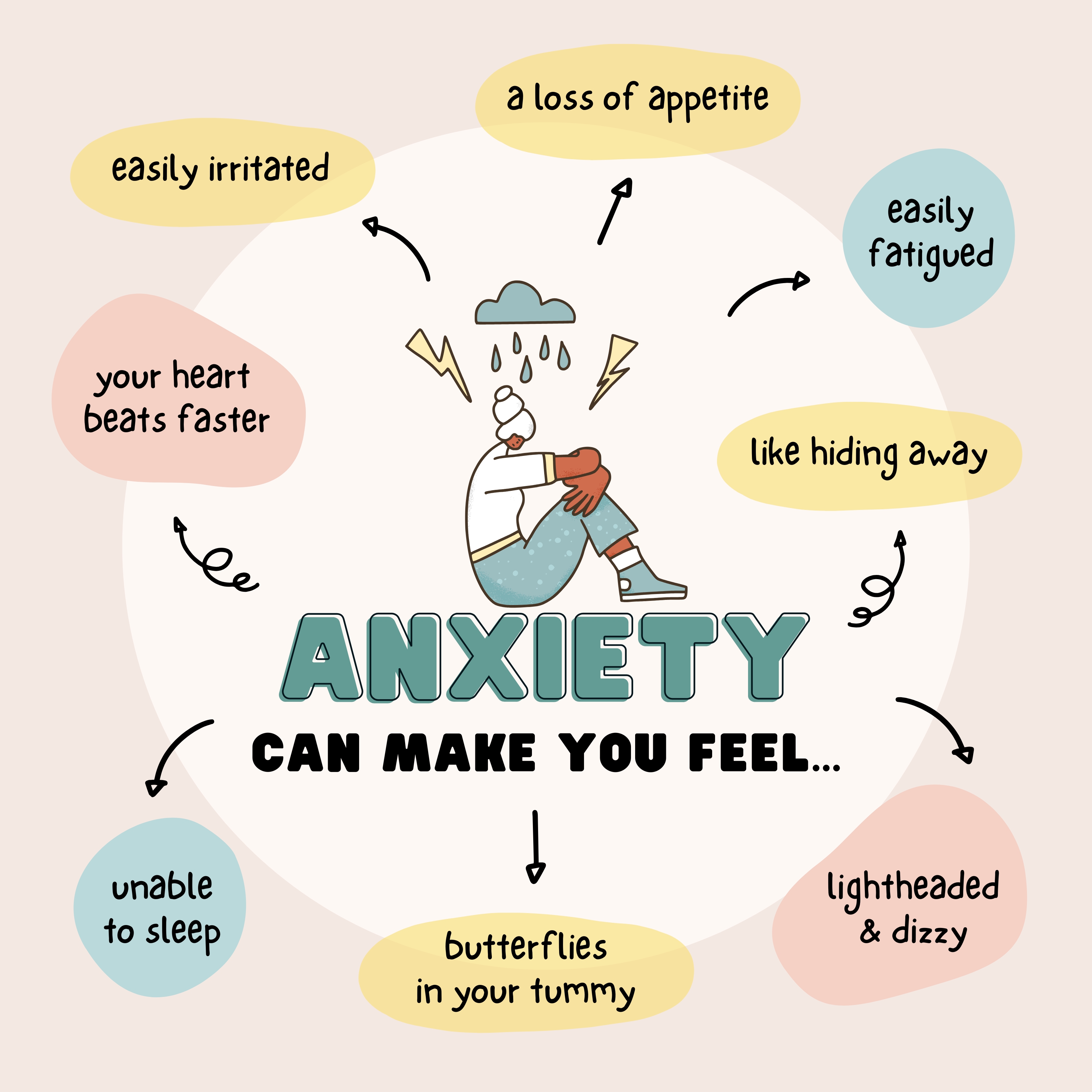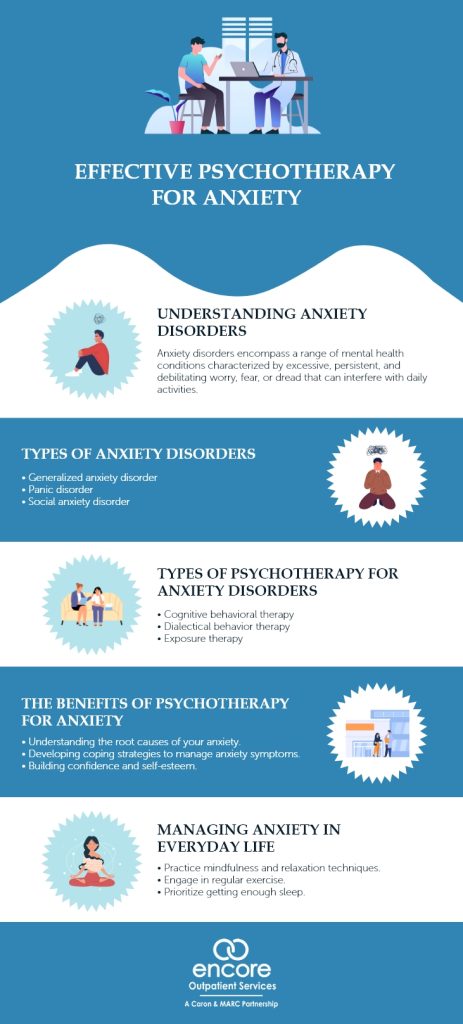Checking Out Different Methods in Counselling for Anxiousness Problem for Lasting Change
When dealing with stress and anxiety problems, it's necessary to explore a variety of therapy approaches. Each method offers unique understandings and tools to help you handle your signs and symptoms properly. You may discover that combining methods can generate the most effective outcomes. Recognizing the subtleties of these approaches is key to cultivating enduring change. What happens if the appropriate combination could release a new degree of emotional health for you?
Understanding Anxiety Disorders: A Short Introduction
Anxiety disorders, which impact countless individuals worldwide, can greatly affect day-to-day live. You could experience overwhelming sensations of concern or stress that appear irrepressible. These sensations can result in physical symptoms like an auto racing heart, sweating, and even lightheadedness. Typical sorts of anxiety disorders consist of generalized anxiety disorder, panic condition, and social stress and anxiety disorder. Each has special indicators, however they all share a tendency to disrupt your routine and relationships.Understanding the source of your anxiousness is vital. It might originate from genes, brain chemistry, or life experiences. Recognizing your triggers can assist you handle your responses better. It's crucial to keep in mind that you're not alone in this struggle. Several individuals encounter similar difficulties, and looking for assistance is a solid step towards sensation better. By discovering stress and anxiety disorders, you're already on the course to understanding and handling your condition much more efficiently.
Cognitive-Behavioral Treatment: Challenging Negative Idea Patterns
In Cognitive-Behavioral Therapy, you'll begin by identifying the unfavorable thought triggers that add to your stress and anxiety. As soon as you acknowledge these ideas, you'll service replacing them with even more favorable alternatives. With each other, you'll construct effective coping strategies to aid handle your anxiousness in daily circumstances.
Recognizing Adverse Thought Triggers

Acknowledging the details triggers behind your adverse thoughts can be vital in managing anxiety when you come across moments of distress. Start by paying focus to circumstances that provoke feelings of worry or worry. Is it a congested area, a forthcoming due date, or a discussion with specific individuals? Take down these circumstances in a journal. This will help you determine patterns in your reasoning. Notification physical feelings that accompany your unfavorable ideas, like a racing heart or rigidity in your chest. By determining these triggers, you obtain understanding right into what's fueling your stress and anxiety. Comprehending these links is the primary step in testing those ideas and inevitably gaining back control over your emotional feedbacks.
Replacing Ideas With Positives
Testing negative idea patterns is an important action in changing your attitude and reducing stress and anxiety. You might frequently locate yourself caught in cycles of insecurity or catastrophic reasoning. Rather than letting these thoughts dictate your sensations, technique replacing them with reasonable alternatives or positive affirmations. When you believe, "I can not manage this," move it to, "I can take care of challenges one step at a time." This easy modification can significantly impact your emotion. Regularly identifying and countering these negative thoughts helps create a healthier internal dialogue. Bear in mind, it takes time and initiative, but consistently practicing this technique can lead to lasting change, empowering you to face anxiety with restored self-confidence and durability.
Building Coping Techniques Together
Replacing negative ideas is just the beginning of taking care of anxiety effectively. To develop lasting adjustment, you require to develop coping methods that empower you. Cognitive-Behavioral Therapy (CBT) helps you recognize and challenge those purposeless idea patterns. Together, you and your therapist can discover exactly how these thoughts influence your sensations and behaviors.Start by establishing useful techniques, like journaling or mindfulness workouts, that enable you to face stress and anxiety head-on. When you face your anxieties progressively, you'll discover to respond differently.

Mindfulness and Acceptance-Based Approaches: Growing Present-Moment Awareness
As you browse the complexities of anxiousness, incorporating mindfulness and acceptance-based techniques can significantly enhance your capability to grow present-moment understanding. By concentrating on the present moment, you'll discover that you can observe your ideas and feelings without judgment (Counseling services for anxiety). This method helps you recognize your anxiousness without feeling overwhelmed by it.Engaging in mindfulness workouts, such as deep breathing, body scans, or guided meditations, enables you to ground on your own in your current experience. Acceptance-based techniques urge you to welcome your emotions instead of battle against them. They lose their power over you.Incorporating these practices into your everyday regimen can change how you respond to stress and anxiety when you approve your sensations. You'll create resilience and discover to browse demanding scenarios with greater simplicity. Eventually, growing present-moment recognition lays the structure for long-term change, empowering you to lead a more fulfilling life
Exposure Therapy: Confronting Fears Gradually
Exposure therapy helps you challenge your fears in a gradual way, making it much less frustrating. You'll find out methods to deal with anxiety-provoking circumstances action by step, while also building coping strategies to handle your responses. This strategy encourages you to take control and minimize stress and anxiety in time.
Gradual Exposure Strategies

When encountering stress and anxiety, gradually challenging your worries can be an effective method to reclaim control. This method, referred to as progressive exposure, includes slowly subjecting yourself to the circumstances or objects that cause your stress and anxiety. Beginning with less daunting situations and progressively work your means up to more tough ones. For instance, if you hesitate of public speaking, you could begin by talking in front of a mirror, after that progress to sharing ideas with a friend, and at some point attend to a little team. Each step helps desensitize you to the concern, constructing your confidence gradually. Bear in mind, it's important to pace yourself and celebrate little triumphes as you relocate through this process, strengthening your capacity to take care of anxiety efficiently.
Building Coping Methods
Structure reliable coping strategies is important for handling anxiousness, specifically as you challenge your fears gradually - Counseling services for anxiety. One powerful method is exposure therapy, where you start by encountering your concerns in a regulated fashion. Start with less daunting circumstances and gradually function your method as much as more difficult situations. This gradual exposure helps desensitize you to anxiety triggers, making them much less overwhelming.Incorporate leisure strategies, such as deep breathing or mindfulness, to soothe your mind during exposure. Track your progress, commemorating tiny success along the method to improve your confidence. Remember, it's okay to take your time; the objective isn't excellence yet steady improvement. By constructing these strategies, you'll empower yourself to navigate stress and anxiety and accept life a lot more completely
Psychodynamic Therapy: Uncovering Source of Anxiety
Psychodynamic treatment checks out the unconscious mind, disclosing the origin causes of your anxiousness. By examining your ideas, feelings, and previous experiences, this technique helps you reveal underlying disputes and unresolved concerns that may add to your existing stress and anxiety. You'll deal with a therapist to check out youth experiences, relationships, and psychological patterns that shape your responses today.As you obtain insight right into these much deeper layers of your mind, you'll begin to identify exactly how past occasions affect your present habits. This understanding can result in catharsis, permitting you to process feelings you may have suppressed.Through the restorative relationship, you can additionally determine defense reaction that might have developed over time, using a clearer path to transform. Eventually, psychodynamic treatment furnishes you with the devices to resolve your anxiety at its core, advertising long lasting improvement in your emotional health.
Holistic and integrative Techniques: Combining Strategies for Greater Effectiveness
Incorporating various restorative techniques can improve your journey toward taking care of stress and anxiety better. By incorporating elements from cognitive-behavioral treatment, mindfulness methods, and holistic strategies, you can create a personalized approach that addresses your special demands. You may utilize cognitive-behavioral methods to challenge negative thought patterns while incorporating mindfulness exercises to ground on your own in the existing moment.Additionally, discovering all natural methods such as yoga exercise or meditation can promote relaxation and lower anxiousness signs and symptoms. This mix enables you to establish greater self-awareness and resilience.Experimenting with these diverse methods can help you uncover what reverberates most with you. Keep in mind, it has to do with finding a synergy that functions, as opposed to adhering to a single method. This integrative technique not only offers immediate relief yet also fosters lasting abilities for managing stress and anxiety, equipping you to redeem control over your life.
The Duty of Support Systems: Building Resilience Through Connection
While it could appear that handling anxiousness is a singular journey, having a strong support group can play an essential role in your strength. Bordering yourself with understanding friends, family members, or support system produces a risk-free room where you can openly share your experiences and sensations. When you attach with others, you remind yourself that you're not the only one in this struggle.These connections supply motivation and can provide sensible coping strategies that have actually functioned for others. It's likewise an opportunity to acquire point of view; buddies can aid you see situations in a different way, decreasing sensations of isolation.Moreover, emotional support cultivates a feeling of belonging, which can significantly ease anxiety signs. By leaning on your support group, you can construct resilience and tackle difficulties better. Keep in mind, getting to out for aid suggests strength, and it can make all the difference in your trip towards taking care of anxiousness.
Frequently Asked Questions
What Are the Typical Signs of Anxiousness Problems?
You might experience restlessness, tiredness, trouble focusing, impatience, muscle tension, and rest disturbances. Physical signs and symptoms can consist of rapid heartbeat, sweating, and shivering. Identifying these signs early can assist you seek proper assistance and treatment.
For How Long Does Therapy Typically Last for Stress And Anxiety Problems?
Treatment for anxiousness problems typically lasts anywhere from a couple of weeks to numerous months. It truly depends upon your private requirements, development, and the techniques your therapist makes use of to aid you handle your anxiousness successfully.
Can Medicine Be Used Alongside Treatment for Anxiousness?
Yes, medicine can certainly be used along with treatment for anxiety. Integrating both methods frequently enhances therapy efficiency, helping you take care of signs while exploring underlying concerns with counseling (Counseling services for anxiety). Constantly consult your doctor for personalized suggestions
Exist Self-Help Techniques for Taking Care Of Anxiety?
Yes, there are numerous self-help methods for taking care of anxiety. You can exercise mindfulness, take part in regular exercise, maintain a well balanced diet, establish a routine, and use deep breathing techniques to help lower stress and anxiety symptoms successfully.
How Do I Know if I Required Professional Assistance for Anxiety?
